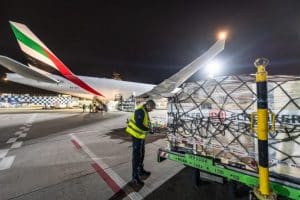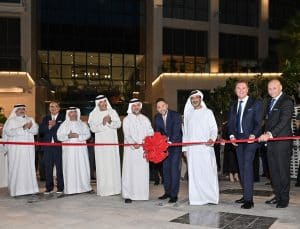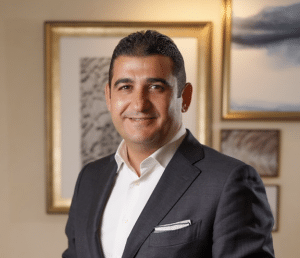As Izu Ani departs Emaar Hospitality’s La Serre Bistro & Boulangerie, he reveals his next exciting venture and some key learnings that will stand him in good stead along the way. Crystal Chesters reports.
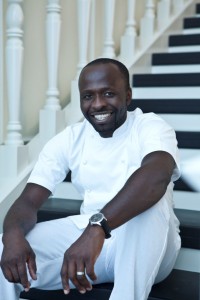 Izu Ani first made his mark in Dubai as the opening head chef of French fine-dining restaurant, La Petite Maison, which catapulted into The S.Pellegrino World’s Best Restaurants list just two years after its launch. Emaar Hospitality then snapped him up to create a new Mediterranean-inspired concept and La Serre Bistro & Boulangerie was born. Today, it’s the most successful restaurant in Emaar’s portfolio.
Izu Ani first made his mark in Dubai as the opening head chef of French fine-dining restaurant, La Petite Maison, which catapulted into The S.Pellegrino World’s Best Restaurants list just two years after its launch. Emaar Hospitality then snapped him up to create a new Mediterranean-inspired concept and La Serre Bistro & Boulangerie was born. Today, it’s the most successful restaurant in Emaar’s portfolio.
Ani attributes his achievements with both of these restaurants to the strong principles he has learned from a handful of important mentors throughout his career, the standout being Philip Howard who Ani met when he was just starting out at The Square in Mayfair, London. Howard instilled into Ani the principles he lived by himself: to always say good morning to your teammates and to be yourself, both at home and at work.
“He taught me to be just who I am,” says Ani during an interview with Catering News at La Serre, just weeks before his departure from the restaurant. “Some chefs try to change themselves and take on a persona, so they become something they’re not. You don’t have to do that – just be who you are.”
So, who exactly is Izu Ani? The Nigerian-born chef was brought up in London but spent a while learning the classics in France and modernist cuisine in Spain before relocating to the Middle East in 2010. Wherever he goes, he dives straight into the centre of the action in an effort to absorb everything around him, with the belief that food, language and culture are intrinsically intertwined.
Speaking of his time in France, where he worked at the two-Michelin starred La Bastide Saint Antoine and the world famous three-Michelin starred Auberge de L’Ill, Ani says: “I didn’t just want to learn French food; I wanted to understand the culture behind the food and to speak French. To do that, you’ve got to go there and be part of it, you’ve got to participate.”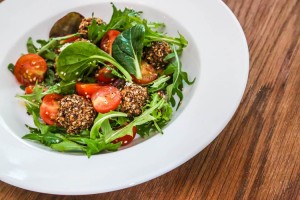
Admitting that in London he was like “a petulant child”, moving to France was a life changing experience for Ani. “The French calmed me down and said ‘Izu, understand what you’re doing; appreciate it instead of trying to beat it or own it. Try to be part of it’,” he recalls. For Ani, understanding food means you can be consistent and replicate a dish the same way each time.
For example, at La Bastide Saint Antoine in the region of Grasse – considered the world’s capital of perfume – Jacques Chibois, the chef at the helm of the restaurant and one of Ani’s key mentors, encouraged him to take a tour of the perfumeries in order to learn the role of fat in bringing out the vapours of the flowers, which is the same principle that can be applied to cooking.
“If you use [fat] correctly it’s your friend, if you use it badly it’s your enemy,” Ani explains. “I always use the phrase, ‘I’m a lazy chef’ because I buy the best ingredients and if I don’t need to do anything, I don’t do anything. I just give it to the guest to enjoy because I understand the product and that’s when you know whether to leave it alone or touch it,” he says. It was also Chibois who taught him about ingredients he chuckles, recalling a particularly strong reaction his mentor had to the kitchen team using out-of-date tomatoes.
“He just went crazy! He took out a box of tomatoes, threw it on the floor and said nobody was allowed to pick them up, so we had to walk around them or run over them. He wanted to teach us a lesson!”
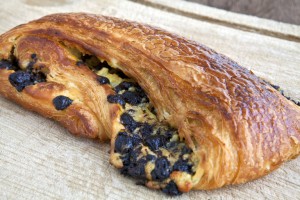 Following the service, the chefs were asked to go to the staff cafeteria where Chibois laid out five different types of asparagus. He started with, “You have no respect for things! You don’t even understand what you’re cooking!” before proceeding to question the chefs on the names of each different type of asparagus and how they should be cooked.
Following the service, the chefs were asked to go to the staff cafeteria where Chibois laid out five different types of asparagus. He started with, “You have no respect for things! You don’t even understand what you’re cooking!” before proceeding to question the chefs on the names of each different type of asparagus and how they should be cooked.
“He wanted us to understand each one. For example, there’s more bitterness in the white asparagus so you cook it differently to the green asparagus. You look at each differently and learn how to use it,” says Ani.
However, Ani’s education didn’t stop there. He was ever-fascinated by modern cooking techniques, including molecular cuisine, epitomised at the time by the world-renowned elBulli restaurant in Catalonia. To find out more, he travelled to the Basque Country in Spain to work for free at Arzak, Mugaritx and Akelarre restaurants, but quickly became disillusioned with how the chefs were doing things.
“There’s a lot of glitz and glamour but when you understand it, you realise there’s not a lot of substance behind it. Classic is always something you go back to and if you understand the classics you can build anything on them.”
In 2010, Ani relocated to Dubai as the opening head chef of La Petite Maison, and keeping in mind the strong principles he had learned in Europe from his mentors, the first thing Ani did was insist on implementing staff wages that were way above the going rate at the time.
“I changed the mentality of how people worked in this industry because they used to find the cheapest people to do the jobs they wanted. I said no, you pay a fair wage for what they’re going to give.
“When I was interviewing people they were telling me they were earning AED 600 per month, and I was shocked,” says Ani, remembering the first person he hired – a Filipino national called Marcel who was so enthusiastic that he came to the interview an hour early.
“I had a lot of affection for him because he was such a hard worker. He came in as a commis at the time but I remember I was paying ridiculous money – AED 3500 – and the boss said, ‘you’re going to kill the market by paying so much – stop it!’ I said, ‘why?’ People have got to earn well to enjoy what they’re doing. You can’t just take from them and not give anything back. If you make a cake and everyone brings an ingredient, everyone should take a piece of the cake.”
When he joined Emaar Hospitality in 2013 to set up Mediterranean concept, La Serre, Ani carried the same philosophy with him, insisting on allocating 25% of the budget to staff wages.
“How are you going to put the product there if you don’t have the talent? You spend first and then you make, because if you try to save first, you don’t make. It’s as simple as that!”
He is also careful not to abuse his good reputation by cutting costs or “cheating” the guests when it comes to ingredients. “I could think that if I change an ingredient for something cheaper they’re not going to know – but I’ll know!” he asserts, highlighting that to this day, he uses Valrhona chocolate in his pastries.
In fact, Ani believes that most restaurants fail as a result of compromising on their principles when the going gets tough, when they should instead be putting more effort into the project. “You invest, you keep adding. You make your customer more loyal to you because you keep your standards high – that’s the way I like to do it.”
Ani thinks another challenge for good restaurants in Dubai like La Serre, is that they can be bypassed as the crowds chase after myriad new openings.
“When there’s so much stuff in your face you can get confused and if you dine out once or twice a week, you’ll realise the places that are good get overlooked because you’re always trying out new things. And with the transit mentality of Dubai, people are just looking to make a quick buck; there’s no investment in the future,” he says.
It’s for this reason that Ani’s next career move won’t be to open another restaurant. And to follow his dreams, he had to part company with Emaar Hospitality. “I’m the spiritual owner of this place, but we didn’t come to an agreement on how to move forward. I don’t want to die in here, I want to keep creating… I want to keep pushing my limits and evolve,” he says.
Ani will turn his attention to sharing his knowledge with others, just as he was taught to do by his mentors, Paul and Marc Haeberlin, the father and son duo behind L’Auberge de L’ill, who said, “nothing you have is yours”.
“How can I claim that everything I’ve learned is mine? A lot of chefs hold everything in – ‘no it’s my recipe’. Everything I have was given to me and I believe that’s the biggest learning I’ve ever had; learning how to share,” Ani says, revealing his latest venture. “I’d love to do a research and development hub where the creativity has no limits or boundaries. We can strive to set a mark and be part of the community,” he says.
The R&D hub will be what Ani refers to as his “playground”. Set in a villa in Jumeirah, it will provide a space where both adults and children can come to learn about ingredients and nutrition. “I have to impart my knowledge to the younger generations,” Ani explains.
“If I can change one kid’s perspective on how to eat, I’ve done my job. I want to put a structure in place so that whoever is yearning to understand a bit more about what we do, please come, I want to share what I know.”
Citing the old saying, “Give a man a fish and you feed him for a day; teach a man to fish and you feed him for a lifetime”, Ani is also keen to revolutionise the way cooking classes are delivered in Dubai, with the aim of helping people to really understand food rather than copy recipes.
“In the future we’ll give cooking classes but in a professional way. It’s not that you come in to learn a recipe, it’s that you come in to understand a product. If I teach you how to understand a tomato, you can use it in any way, because you’re not following something, you’re being a part of something, and that’s the key.”
In addition to the educational element, Ani will run a chef’s table, which opens on an ad-hoc basis with no menu and very limited seating. And with his strong background in France, he also wants to open a boulangerie within the building, commenting: “There will be elements in the villa that will be broken up into research and development for bakery and pastry.”
A greenhouse will also be constructed where Ani will grow his own fresh produce, and a test lab will allow him to trial new recipes and menu concepts.
“It’s not a gimmicky place, I’m researching things, I’m trying to understand more. I’ve done the food, but then there’s the culture behind the food and some days I’ll let you see what I’m doing, I’ll allow you to come and taste it.”
At the time of our interview, Ani was about to embark on a research trip around Asia to “add layers” to his cooking, before returning at the start of June to work full steam ahead on his new project, which is set to open before the end of 2016. And while many F&B concepts in Dubai are nothing more than a flash in the pan, Ani asserts he is here for the long-run, and wants to put something back into the community.
“When you have a transit mindset, in certain ways you stop living because you don’t commit fully. So I say no, I’m going to commit. This is where I live now, this is my home and I’m going to invest in it. I want to evolve the culture not just take from it,” he concludes.


